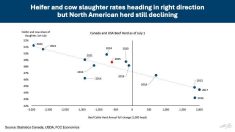Canadian canola may have a bite at the U.S. biofuel market after the U.S. Environmental Protection Agency (EPA) proposed in mid-April that canola oil-derived renewable diesel, jet fuel and other biofuels qualify as “advanced biofuels” under the Renewable Fuel Standard (RFS) program.
The EPA determined that “greenhouse gas (GHG) emissions from renewable diesel, jet fuel and other fuels derived from canola oil were more than 50 per cent lower than petroleum-based fuels,” an April 18 release from the Canola Council of Canada said.
“Canola-based biofuels offer tangible emissions reductions, largely because growers have such a strong track record of sustainable production practices,” Jim Everson, Canola Council of Canada (CCC) president, said.
Read Also

Canola growers face rising verticillium stripe threat with few options
After a severe 2025 outbreak, verticillium stripe is drawing attention at Prairie agronomy meetings as researchers warn of uncertain yield impacts and slow resistance progress.
The canola council welcomed the proposed decision as a potential foothold for Canadian-grown canola oil in “the growing U.S. renewable diesel and sustainable aviation fuel markets, putting canola on a level playing field with other oilseed crops,” Everson said.
“In addition to the environmental benefits, this will also help diversify markets and support value-added processing, creating opportunities for the entire canola sector,” he said.
In 2020, the council petitioned the EPA to include canola oil on its approved list of possible biofuel feedstocks, along with the Canadian Oilseed Processors Association and U.S. Canola Association.
The CCC also pointed to its Keep it Coming 2025 strategic plan. The industry group has set a target that would see an average 52 bushels per acre production and 26 million tonnes of canola produced annually by the year 2025.
The EPA has said its analysis of the greenhouse gas life cycle of canola/rapeseed biofuels is now open for comment.
If approved, the agency said, those types of biofuels would be eligible to generate Renewable Identification Numbers (RIN), the credits used for compliance within the RFS system, “provided they satisfy the other definitional and RIN generation criteria for renewable fuel specified in the RFS regulations.”















